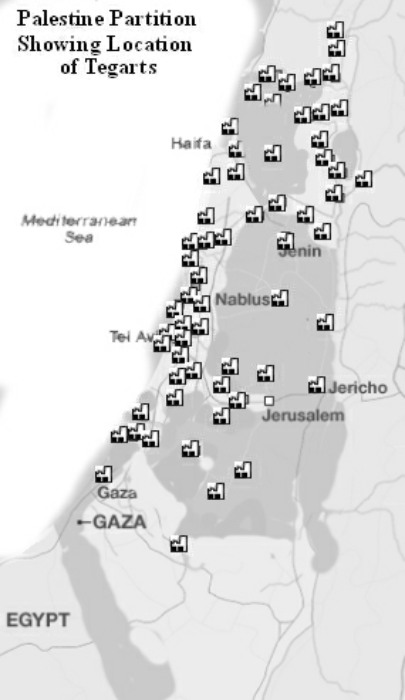Pages in Section 13

Evacuation of the British Police
ii. Evacuation - Hebron
ii. A HOP adventure
iv. Bassa
v. Safad
vi. Jenin - A holding Camp
vii. Tiberias
viii. Haifa
ix. Jaffa
x. The last Day
Stand down
Next - Old Comrades and New Ventures
 The Palestine police top brass surveying the UN's proposed partition map must have looked aghast when comparing the UN 1947 partition plan with a map showing the location of the tegarts and police stations.
The Palestine police top brass surveying the UN's proposed partition map must have looked aghast when comparing the UN 1947 partition plan with a map showing the location of the tegarts and police stations.
For 28 years commanders of the Palestine Police had worked on the assumption that on Palestine Independence Day they would transfer the force to a single independent authority and each police station would have its own handing-over ceremony.
What were they to do now with the many tegarts in the the new Jewish territory surrounded by Arab villages and manned mainly by Arabs. Northern Palestine was going to be particularly tricky. How would the Jewish underground forces re-act if British police handed over tegarts in Jewish territory to hostile Arabs? How would Arabs re-act if their nearest police station was manned solely by Jews?
The only real solution was to hand over the police force as a whole to UN administration for a transition period while the British, still theoretically in charge, were otherwise occupied evacuated their personnel and disposing of weapons in such a way that neither Arabs nor Jews would benefit. A transitional UN peace-keeping force was needed but the UN, despite its vote for partition, had no peace -keeping force to spare.
In consequence, the evacuation of British police and equipment from a Palestine, where Arabs and Jews already fighting each other, became a complicated task that could only to be undertaken in collaboration with the army.
Unfortunately for the police it was not to be a collaboration between equals. The British government placed the army in charge of evacuation. The mind-set of the army differed greatly from that of the police.
The army's priority was to pull British personnel out of the country as safely as possible, regardless of the safety of local residents. During the evacuation period, soldiers were forbidden to fight except in self-defence or to protect British civilians. The army's commanding officer told the Inspector General of the Police that his British police must leave tegarts and smaller police stations by stealth with no ceremonial hand-overs. Police rank and file received no information as to the date of their evacuation or who would take over the duties they abandoned. In the pursuit of a hassle-free evacuation the army even made deals with local Jewish and Arab armed forces, often to the detriment of the local civilian population. Numbers of British police felt guilty over army deals that endangered the Arab civilian population. Although there was nothing they could do about it legally, a few mutinied with dire results to themselves.
For the most part, Jews fared better than Arabs during the British police evacuation. Tel Aviv, the all Jewish town had its own all-Jewish police force. Jewish zones in Jerusalem had worked largely without British policemen since the bombing in Yehuda Street. Jewish settlements had the Jewish Notrim.
>The Arab police, on the other hand, had worked side by side with British police in tegarts and police stations in rural areas. In many cases when the British withdrew there would be too few police in those buildings to run a credible service so the police chiefs did a deal with the now independent Jordan. When the British Police left the areas the UN had allocated to the Arabs, the Arab Legion would take their place.
British police involved in these early rural evacuations were either re-assigned to District Police HQs or kept in transit camps before eventually being sent to Haifa where troop ships returned them to England. Young policemen still aged 18 were the first to leave Palestine.
The next pages show how the evacuation affected British members of the Palestine Police.